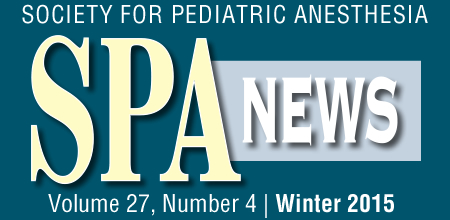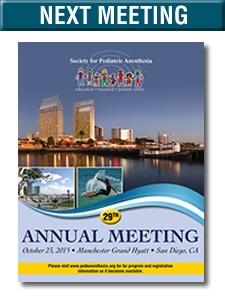WFSA Update for the Society for Pediatric Anesthesia
By Julian Gore-Booth
Chief Executive Officer – WFSA
ceo@wfsahq.org
There’s a lot going on at the World Federation of Societies of Anaesthesiologists. Most important for the anaesthesiologist with an international perspective is the ongoing shift to a more strategic Programme Approach with Education and Training, Safety and Quality, Innovation & Research and Advocacy, providing a framework for all that WFSA does.
The continuing education of anaesthesiologists around the world remains very much the focus for WFSA’s efforts, and we have a worldwide network of members and volunteers that help us respond to this challenge. This is evidenced across our programmes and by the fact that not only have we published a 29th Update in Anaesthesia (kudos to Dr Bruce McCormick and his team), but also have available more than 310 Anaesthesia Tutorials of the Week on the WFSA site at www.wfsahq.org
The value of these hundreds of anesthesia educational articles and tutorials is being recognised with improved search facilities on the website (for example allowing archives to be searched by keyword and category) as well as by online sign up and mailing systems that ensures that our readers are informed as soon as new publications become available. We are also developing a more obvious Resource Section on the site that points the way, not only to WFSA publications, but also to open source materials from other publishers that we think might be useful to you. We hope that this will move us further along in our ambition for the WFSA site to become a “one stop shop” for anaesthesiologists everywhere, especially those who seek further learning or teaching within the specialty.
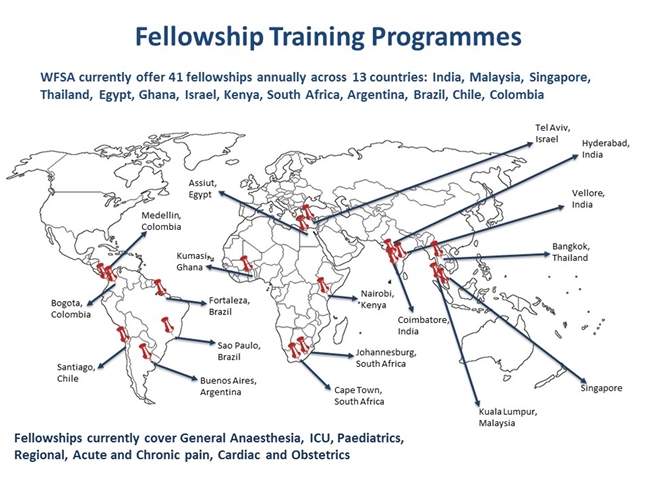
Change can also be measured by the increasing number of anesthesia fellowships being offered each year, with over 40 available through the WFSA. These fellowships are offered in a range of specialist areas within anaesthesia and offer young anaesthesiologists from low and middle income countries extraordinary opportunities to improve their knowledge and skills in a cost effective and impactful manner. They make fantastic use of the WFSA global network and you can find out more about them at http://www.wfsahq.org/our-work/education-training

Dr. Zin Ohmmar Kyaw (Myanmar) in training at the Bangkok Anesthesia Regional Training Center (sponsored through WFSA by the Finnish Society of Anaesthesiologists)
Support from the WFSA, the Society for Pediatric Anesthesia (USA) and the Association of Paediatric Anaesthetists of Great Britain and Ireland (APAGBI), has allowed for a paediatric fellowship programme in Nairobi, Kenya, to get off to a strong start. The fellowship is open to anaesthesiologists working in Central and East African countries and the overall aim is to improve the quality and safety of paediatric anaesthesia throughout the region. Fellows have been rotating through several hospitals – Kenyatta National Hospital, Gertrude’s Children’s Hospital, Mater Hospital, and Kijabe Hospital. Teaching has been provided by local faculty as well number of visiting overseas specialists. Funding from the WFSA, SPA and APAGBI has enabled the first group of fellows, Dr. Susane Nabulindo (Kenya), Dr. Emma Mutio (Kenya) and Dr. Richard Kabuye (Uganda) to complete the programme.
During the 2013/14 year, local teaching was supplemented by four visits from external teachers (Dr. Michael Dobson – Teach the Teacher, Dr. Quentin Fisher – Airway, Head and Neck, Dr. Faye Evans – Regional Anaesthesia, Dr. Carolyn Stickney – Intensive Care). The first cohort finished in August 2014 and another three fellows started in September 2014 – they are Dr. Christopher Chanda (Zambia), Dr. Nancy Okonu (Kenya) and Dr. Allan Kochi (Kenya). Another four external teaching visits are planned this year. The programme is run by the University of Nairobi and Dr. Mark Gacii continues as the programme head.
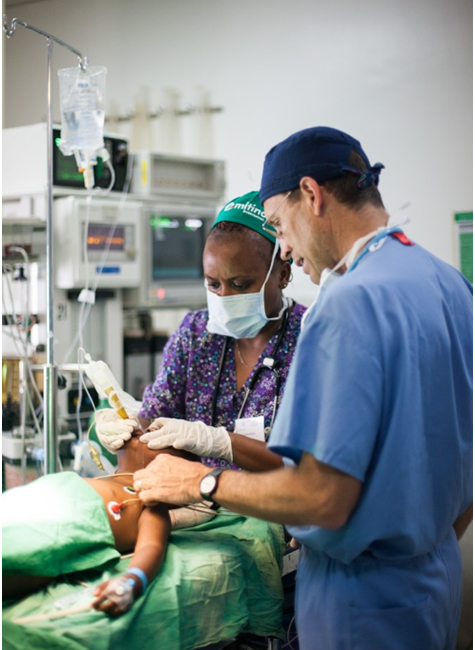
Dr. Susane Nabulindo and Dr. Mark Newton at Kijabe Hospital
Reporting on her time in Nairobi, WFSA fellow Dr. Susane Nabulindo commented, “The knowledge and skills I acquired will help me to give children quality anaesthesia care. I am faculty at the University of Nairobi and through teaching I will be able to share the skills acquired. I will also be involved in building up the fellowship as we strive to bring it to international standards. I plan to organize and be involved in outreach to areas in the country without paediatric anaesthesiologists and teach some basic skills which will improve paediatric anaesthesia care.”
Worthy of celebration is the fact that we have now awarded over 100 WFSA-Baxter scholarships. Since 2008 these scholarships have allowed young doctors, who would otherwise not be able to attend, the opportunity to present posters and take part in World and Regional Congresses of Anaesthesiologists. The scholars themselves attest to the value of these awards with 94% identifying positive impact for patients and 98% saying they would encourage their colleagues to apply. This is remarkable and I can add from my own experience of meeting scholars that these awards bring very real value to the outstanding individuals selected.
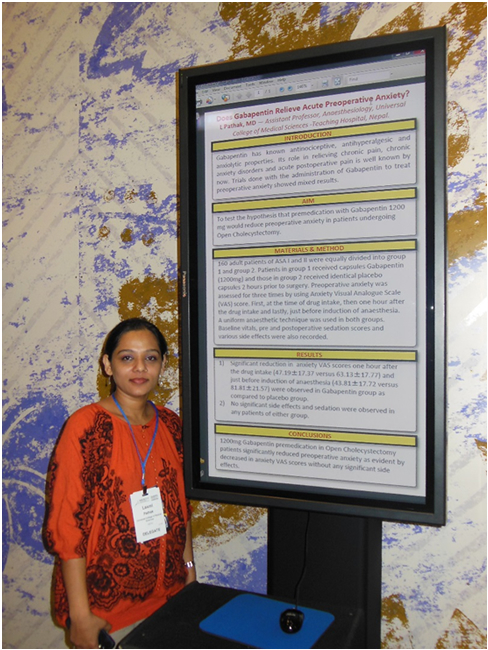
Laxmi Pathak (from Nepal), WFSA-Baxter Scholar with her poster at the 14th Asian Australasian Congress, Auckland 2014
The WFSA is also very proud of the ongoing Manpower Survey, which is being led by Dr Peter Kempthorne (New Zealand). This aims to map the availability of anaesthesia provision and education around the world and will ultimately provide a global gap analysis and plan of action for the WFSA. This is a sizeable piece of work and we hope to have collected meaningful data and provided analysis during 2015. If this could be repeated every four years it would become a significant measure of progress ... so the ambition is clear! More immediately available is the book “Occupational Wellbeing in Anaesthesiologists” which can be downloaded for free from the website by visiting http://www.wfsahq.org/our-work/safety-quality. On the same webpage you can find the International Standards for a Safe Practice of Anaesthesia, and the checklist that goes with the Standards as well as some very useful guidelines for tendering for Anaesthesia machines – especially relevant for those working in environments that do not have access to reliable supplies of oxygen and / or electricity. We also feature Lifebox, the UK based charity of which WFSA is a founder and ongoing supporter. Many of you are already involved with Lifebox in support of their mission to make surgery safer.
Other things to look out for include the launch of our Innovation Awards with a focus on initiatives that demonstrate or strengthen the role of anaesthesia in improving surgical patient outcomes. These awards will be made at the World Congress of Anaesthesiologists in Hong Kong 2016, which we hope many of you will attend. Details about criteria and how to apply can be found here http://www.wfsahq.org/our-work/innovation-research. We are also very proud and excited about a new partnership with the International Anesthesia Research Society (IARS) which foresees the establishment of a Global Health Section in the highly respected journal Anesthesia & Analgesia (A&A). This affiliation between WFSA and the IARS aims to focus the attention of the best minds in anaesthesia on advancing the healthcare of patients worldwide, and particularly in resource-poor environments.
Finally, we are keen to emphasise an area of our work that is both a challenge and a major opportunity for anaesthesiology around the globe. In 2015 the World Health Assembly will vote on a resolution entitled, “Strengthening emergency and essential surgical care and anaesthesia as a component of universal health coverage”. In his letter to all WFSA member societies, WFSA President Dr. David Wilkinson wrote, "If approved, the resolution would change the situation of our profession, and of surgical patients (and those who need surgery) around the world for the better. It is likely that it would also significantly influence the amount of resources made available for anaesthesia, shifting national and donor budgets towards the 11%+ of the global burden of disease that could be addressed by surgery. With the poorest 30% of our world accessing just 3% of the surgery, and with mortality rates from surgical intervention 1,000 times higher in some parts of the world than in others, it is my sincere hope that we are all bound together behind this resolution." This challenge, together with that of drafting Sustainable Development Goals (to replace the Millennium Development Goals or MDGs) that do more to recognise the impact of surgery and anaesthesia on global health, merits the attention of all of us http://www.wfsahq.org/our-work/advocacy.
Please feel free to get in touch with Richard Lynas (Programmes Manager programmes@wfsahq.org), Nichola Page (Administrative Officer admin@wfsahq.org) or myself, if you have any questions or if volunteering for the WFSA might be for you. We count on the support of volunteers, and you can register with us online at http://www.wfsahq.org/get-involved/volunteer.

